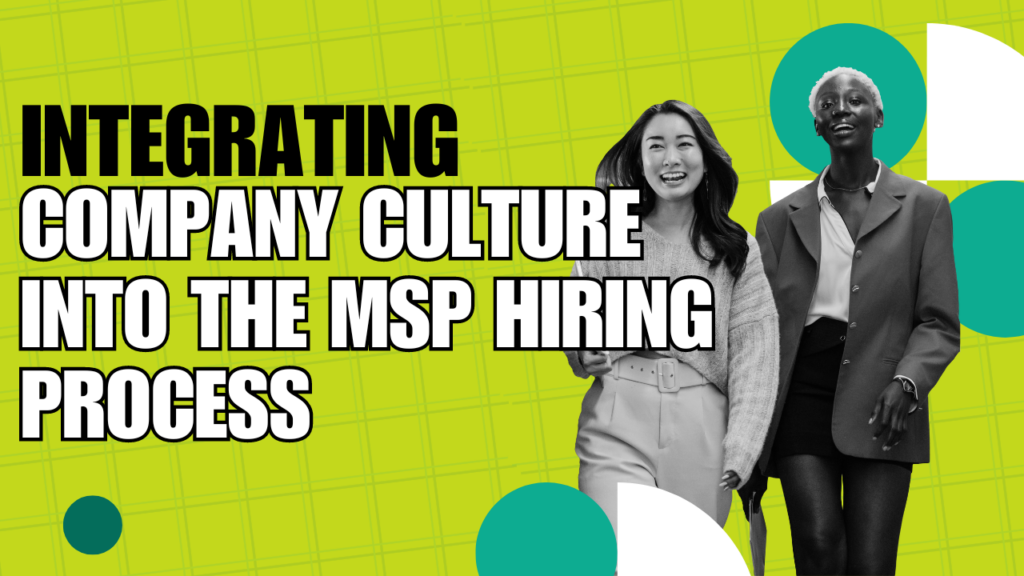Company culture is pivotal in determining an MSP’s hiring success. Discover practical strategies for leveraging company culture to enhance your MSP’s competitive edge and achieve long-term success.

- Explanation of company culture and its importance in the MSP industry.
MSP company culture refers to the shared values, beliefs, and practices that define an organization’s environment and how employees interact within it. In the Managed Service Provider (MSP) industry, where the competition for skilled talent is fierce, a strong company culture is not just beneficial—it is essential.
A positive and well-defined culture attracts high-caliber professionals, fosters a sense of belonging, and boosts employee morale. It drives engagement, innovation, and loyalty, which are critical factors for the success and growth of MSPs.
- Overview of how company culture influences hiring success, employee retention, and business growth.
The influence of company culture extends far beyond the internal workings of an organization. For MSP staffing companies, a vibrant and supportive culture can significantly enhance hiring success by drawing in candidates who align with the company’s values and work environment. According to a study by CrewHu, 63% of employees believe that a company’s culture directly impacts the success of the organization.
Moreover, a positive culture is instrumental in retaining talent. When employees feel valued and engaged, they are more likely to stay with the organization, reducing turnover rates and the associated costs of hiring and training new staff. This stability allows MSPs to build stronger teams, improve service quality, and maintain consistent client relationships.
Ultimately, a robust company culture fuels business growth. It fosters innovation by creating an environment where employees feel empowered to share ideas and take initiative. As a result, MSPs can adapt more quickly to industry changes, offer better solutions to clients, and stand out in a crowded market.
Defining Company Culture in the Context of an MSP
The key components of company culture within MSPs include core values, mission, and work environment. Core values represent the fundamental beliefs that guide employee behavior and decision-making processes. For instance, transparency, integrity, and customer focus are common values that can shape a cohesive and productive workforce.
- Key components of company culture in MSPs (values, mission, work environment).
The mission statement articulates the company’s purpose and goals, providing employees with a sense of direction and motivation. It is essential for MSPs to clearly define and communicate their mission to ensure that all team members are aligned with the organization’s objectives.
- The impact of company culture on team dynamics and customer service.
Company culture profoundly affects team dynamics and customer service within MSPs.
When employees are happy and engaged, they are more likely to provide exceptional customer service. They take pride in their work, go the extra mile to meet client needs, and maintain a proactive approach to problem-solving. This not only enhances client satisfaction and loyalty but also strengthens the company’s reputation in the market.
A case study from ConnectWise highlights how a strong company culture led to improved team dynamics and customer service. By fostering an environment of trust and respect, the company was able to enhance employee engagement and deliver superior service to its clients.
Company Culture’s Impact on Attracting Talent
In the competitive MSP industry, attracting top talent is crucial for maintaining a high level of service and driving business growth. A positive company culture is a significant differentiator that can draw in exceptional candidates.
- How a positive culture can attract top talent in competitive markets.
According to a study by LinkedIn, 40% of professionals want to know about the MSP company culture (+27% interested in the company vision) in the first interaction and 25% of them would change their current jobs for one with a better company culture.
A well-defined culture that promotes values such as transparency, innovation, and employee well-being creates an attractive proposition for job seekers.
Showcasing a positive culture through branding and social media can enhance an MSP’s reputation. Potential candidates often research companies extensively before applying, and a visible commitment to a positive workplace culture can tip the scales in favor of applying to your MSP over competitors.
- The role of culture in appealing to candidates who are a good fit for remote or flexible working models.
The shift towards remote and flexible working models has transformed the hiring landscape. Candidates now seek employers that offer work-life balance and adaptability. A company culture that embraces flexibility can attract candidates who value remote work options.
This approach not only widens the talent pool but also aligns with the growing demand for flexible working conditions. Emphasizing these aspects in job postings and during the interview process can make your MSP more appealing to candidates looking for flexibility.
Culture and Employee Retention: The Link to MSP Success
Employee satisfaction is closely tied to the strength of an organization’s culture. A positive company culture fosters a sense of belonging, purpose, and motivation among employees, which translates to higher retention rates. In the MSP industry, where the cost of turnover can be significant, retaining skilled employees is essential for long-term success.

- The relationship between company culture and employee satisfaction.
A case study from ConnectWise illustrates this relationship. By focusing on creating a culture of trust, transparency, and continuous learning, ConnectWise has achieved remarkable employee retention rates. Their culture emphasizes recognition, professional development, and work-life balance, which contributes to overall job satisfaction and loyalty.
Moreover, the Harvard Business Review highlights that companies with strong cultures experience significantly lower turnover rates. Employees who feel aligned with the company’s values and mission are more likely to remain committed and engaged. This is particularly important in the MSP sector, where continuity and expertise are crucial for delivering consistent service to clients.
To further enhance employee satisfaction, MSPs can implement initiatives such as regular feedback loops, wellness programs, and career development opportunities. These efforts demonstrate a genuine commitment to employee well-being and professional growth, reinforcing a positive culture that keeps employees engaged and motivated.
Strategies for Cultivating a Strong MSP Culture
Defining and communicating your MSP’s core values and mission statement is the foundation for cultivating a strong company culture. These values and mission should align with your business objectives and employee expectations.
- Establish Clear Values and Mission
At ConnectWise, the core values of integrity, innovation, and customer focus are embedded in every aspect of their operations. This clear articulation helps employees understand the company’s direction and their role within it, fostering a sense of purpose and alignment.
- Lead by Example
Leaders and managers should embody the company’s values in their actions and decisions, setting a standard for the rest of the team. When leaders demonstrate commitment to the company’s core values, it sets a powerful example for employees to follow.
- Foster Open Communication
Creating channels for open and transparent communication within the organization encourages feedback and dialogue at all levels. Effective communication helps build trust and ensures that employees feel heard and valued.
- Recognize and Reward
Implementing recognition programs that celebrate employee achievements and contributions in line with the company culture can boost morale and motivation. Recognition can come in various forms, such as awards, bonuses, or public acknowledgment. CrewHu, an MSP known for its strong culture, has successfully used a peer-recognition platform to highlight employee accomplishments. This approach not only motivates employees but also reinforces the values and behaviors that the company aims to promote.
- Prioritize Employee Well-being
Developing programs and initiatives that support the physical and mental health of employees is crucial for maintaining a positive culture. Acknowledging the importance of work-life balance can lead to higher job satisfaction and retention. These initiatives show employees that the company cares about their overall well-being, fostering loyalty and engagement.
- Encourage Professional Development
Offering opportunities for employees to grow their skills and careers within your MSP is essential for long-term success. This can include training sessions, workshops, and clear career pathing.
- Build a Team Spirit
Organizing team-building activities and events that promote collaboration and strengthen relationships among employees can significantly enhance the workplace environment. Activities such as retreats, team outings, and collaborative projects can help build camaraderie and a sense of community.
- Cultivate Diversity and Inclusion
Actively working towards creating a diverse workforce and an inclusive environment where everyone feels valued and respected is vital for a healthy company culture. This involves not only diverse hiring practices but also fostering an inclusive environment where different perspectives are valued.
- Adapt and Evolve
Regularly assessing and adapting your company culture in response to feedback, industry trends, and changes within your MSP ensures that it remains relevant and supportive of your goals. This involves conducting regular culture assessments and being open to making necessary adjustments. For example, as highlighted by the Harvard Business Review, companies that continuously evolve their cultures in response to internal and external changes are better positioned for sustained success.
- Communicate the Culture During Hiring
Integrating your company culture into the hiring process by discussing it during interviews and looking for candidates who share your values and fit within the culture is crucial for maintaining a strong cultural fit. This can include asking culture-specific questions during interviews and providing candidates with insights into the company’s culture. Indeed recommends showcasing your company culture in job postings and interviews to attract candidates who will thrive in your environment.
Assessing and Evolving Your MSP’s Company Culture
Measuring the effectiveness of your company culture is crucial to ensure it aligns with your goals and supports your employees. Several techniques can be employed to assess your culture.
Techniques for measuring the effectiveness of your company culture.
Employee Surveys: Regularly conducting anonymous surveys can provide insights into how employees perceive the company culture. Questions should cover areas such as job satisfaction, alignment with company values, communication, and overall workplace environment. Companies like Harver emphasize the importance of using detailed surveys to gauge cultural health.
Focus Groups: Organizing focus groups allows for in-depth discussions about specific cultural aspects. This qualitative approach can uncover nuanced insights that surveys might miss.
Exit Interviews: Analyzing feedback from exit interviews can help identify cultural issues that may be driving turnover. Patterns in responses can highlight areas needing improvement.
Cultural Audits: Conducting a thorough cultural audit involves reviewing company policies, practices, and behaviors to ensure they align with the stated values and mission. External consultants can provide an unbiased assessment of your culture.
Performance Metrics: Linking cultural initiatives to performance metrics such as employee retention rates, productivity levels, and customer satisfaction scores can provide quantitative data on the culture’s impact.
- Approaches for evolving and improving culture in response to employee feedback and business growth needs.
Evolving and improving your company culture is an ongoing process that requires responsiveness to employee feedback and adaptability to business growth needs:
Regular Feedback Loops: Establish continuous feedback mechanisms such as suggestion boxes, regular one-on-one meetings, and town hall sessions. This ensures that employees feel heard and their input is valued.
Action Plans: Develop action plans based on the feedback received. For example, if employees express a need for more professional development opportunities, implement training programs and career advancement workshops.
Leadership Involvement: Leaders should be actively involved in cultural initiatives. By demonstrating a commitment to evolving the culture, they set a precedent for the entire organization.
Cultural Ambassadors: Appoint cultural ambassadors or committees to spearhead cultural initiatives and ensure alignment across departments. These ambassadors can help in organizing events, monitoring progress, and promoting cultural values.
Flexibility and Adaptation: As the business grows, the culture should adapt to new challenges and opportunities. For instance, during rapid expansion, maintaining a strong culture requires proactive strategies to integrate new employees and preserve core values.
Transparency: Communicate openly about the steps being taken to evolve the culture and the reasons behind these changes. Transparency builds trust and ensures everyone is on the same page.
Integrating Company Culture into the Hiring Process
Define Cultural Attributes: Clearly define the cultural attributes that are important for your organization. These should be communicated in job descriptions and throughout the hiring process.

Behavioral Interview Questions: Use behavioral interview questions to assess a candidate’s alignment with your cultural values. For example, ask candidates to describe past experiences that demonstrate teamwork, innovation, or customer focus.
Cultural Fit Assessments: Implement cultural fit assessments as part of the recruitment process. Tools like personality tests and situational judgment tests can help gauge a candidate’s compatibility with the company culture.
Team Interviews: Involve team members in the interview process to get multiple perspectives on the candidate’s cultural fit. This collaborative approach ensures that the candidate aligns with the broader team dynamics.
Realistic Job Previews: Provide candidates with realistic job previews that highlight your company culture. This can include videos, office tours, or testimonials from current employees. It helps candidates understand the environment they will be working in and assess their fit.
- Onboarding new hires in a way that immerses them in the company culture from day one.
Effective onboarding is crucial for immersing new hires in your company culture from the start:
Structured Onboarding Program: Develop a comprehensive onboarding program that includes cultural orientation sessions. Introduce new hires to the company values, mission, and expected behaviors through interactive sessions and materials.
Mentorship Programs: Pair new employees with mentors or cultural ambassadors who can guide them through the initial stages of their employment.
Cultural Immersion Activities: These can include team-building exercises, social events, and participation in cultural rituals or traditions.
Regular Check-Ins: Schedule regular check-ins during the onboarding period to address any concerns and reinforce cultural values
Feedback Mechanisms: Provide opportunities for new hires to give feedback on the onboarding process and their cultural integration experience. Use this feedback to continuously improve the onboarding program.
Cultural Resources: Offer resources such as handbooks, videos, and online courses that new hires can access to learn more about the company culture at their own pace.
The Role of Leadership in Shaping and Maintaining Culture
Leadership plays a crucial role in shaping and maintaining company culture. MSP leaders can embody and reinforce company culture through their actions, decisions, and communication.
- How MSP leaders can embody and reinforce company culture.
By setting the tone from the top, leaders can ensure that the organization’s values and behaviors are consistently demonstrated across all levels.
Leaders can also reinforce company culture by recognizing and celebrating employees who exemplify the desired cultural attributes. This not only rewards those who align with the culture but also sets a clear example for others to follow.
- The importance of transparent communication from leadership to foster a culture of trust and respect.
Transparent communication from leadership is essential for fostering a culture of trust and respect. When leaders communicate openly about the company’s goals, challenges, and successes, it builds credibility and trust among employees. This transparency ensures that everyone is on the same page and understands the company’s direction.
Transparent communication also involves listening to employees and addressing their concerns. Leaders should create opportunities for feedback and dialogue, demonstrating that they value employees’ input and are willing to make changes based on it. This two-way communication fosters a culture of mutual respect and collaboration.
Overcoming Challenges in Maintaining Culture During Rapid Growth or Change
Maintaining a strong company culture during periods of rapid growth or change can be challenging.
- Addressing the difficulties of preserving culture amidst expansion or shifts in business strategy.
As an MSP expands, the influx of new employees, changes in business strategy, and scaling of operations can dilute the established culture. MSPs must proactively address these challenges to preserve the core values and behaviors that define the organization.
One common difficulty is integrating new employees into the existing culture. Rapid hiring can lead to a cultural mismatch if new hires are not adequately screened for cultural fit or properly onboarded.
Additionally, shifts in business strategy may require changes in processes and priorities, potentially causing cultural misalignment.
To address these difficulties, MSP leaders must focus on consistently communicating the importance of the company’s values and mission. Ensuring that new hires undergo thorough cultural orientation and are mentored by existing employees can help integrate them smoothly.
- Solutions for ensuring culture remain a priority during periods of change.
Ensuring that culture remains a priority during periods of change involves several strategic actions:
- Cultural Ambassadors: These individuals can act as role models and provide support to new employees, ensuring that cultural values are consistently upheld.
- Regular Culture Assessments: This can include surveys, focus groups, and feedback sessions to gauge employee sentiment and identify areas that may need attention.
- Continuous Communication: Leaders should regularly highlight cultural successes and address any concerns or deviations from the desired culture.
- Adaptation and Flexibility: Be willing to adapt cultural practices to fit the changing needs of the organization. This might involve updating policies, introducing new cultural initiatives, or modifying existing ones to better align with the evolving business landscape.
- Leadership Commitment: Ensure that leadership remains committed to maintaining the culture. Leaders should consistently demonstrate cultural values in their actions and decisions, setting a standard for the entire organization.
Summary of the critical role company culture plays in the hiring success and overall performance of an MSP.
Company culture plays a critical role in the hiring success and overall performance of an MSP. A well-defined and positive culture attracts top talent, enhances employee satisfaction, and drives retention.
The relationship between company culture and business outcomes is clear: organizations with strong cultures experience higher levels of employee engagement, lower turnover rates, and better overall performance.
- Final thoughts on the continuous effort required to cultivate and maintain a strong culture for long-term success.
Cultivating and maintaining a strong company culture requires continuous effort and commitment from MSP leadership and employees alike. It is not a one-time initiative but an ongoing process that involves regular assessment, adaptation, and reinforcement. Leaders must remain vigilant in promoting and embodying the company’s values, while also being open to feedback and willing to make necessary changes.
A thriving culture is built on trust, respect, and a shared sense of purpose.
In conclusion, the investment in building and maintaining a strong company culture is one of the most impactful strategies an MSP staffing company can employ to ensure long-term success.



0 Comments